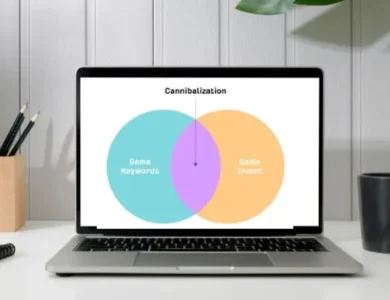
Starting a new website and ranking it on Google involves focusing on a lot of Search Engine Optimization strategies. Besides publishing quality content, building high-quality backlinks is extremely important.
These links help build website authority, which is a direct ranking factor used by many search engines.
Building links for a new website can be tough. There’s very little content on the site, and not many people know about it. Still, by following some simple steps, you can build quality links with authoritative websites to improve your website’s quality. That’s all you’re going to learn in this step-by-step tutorial.
Let’s start.
What are Backlinks?
A backlink is any link that you get from other websites. They are also known as inbound links. For example, if a website writes about the best SEO agencies in your local area and mentions your agency, you’re likely to get a link from this website.
Search engines like Google use such links as a direct factor to determine a website’s authority.
So, you can consider it a vote of confidence received from other high-authority websites on the Internet. It signals search engines that your website has something valuable to offer visitors. As a result, the site’s chances of getting ranked in search results increase through better link building and domain authority.
To analyze these signals properly, a Backlinks Checker plays a crucial role. It helps you track which websites are linking to your content, the quality of those backlinks, and how they impact your overall SEO performance. By using a Backlinks Checker, you can identify strong referral domains, remove harmful links, and build a smarter link-building strategy that improves your website’s authority and search rankings over time.
What is Domain Authority, and How Do Backlinks Build it?
Domain Authority (DA) is a score developed by Moz that determines a website’s overall trustworthiness. It predicts how likely a website is to rank at the top search engine result pages (SERPs). It’s a factor that’s not directly used by Google. Still, it’s an industry standard to indicate the overall SEO strength of a website.
The DA score ranges from 1 to 100, where 1 is the lowest and 100 is the highest score.
These links help websites gain a higher DA score. They signal search engines about the overall relevance, authority, and trustworthiness of your website. The more quality links the site receives, the higher its DA score becomes.
How to Build Backlinks for a New Website?
Now, let’s get straight to the business and discuss how you can build links for your new website. Here’s the step-by-step guide for it:
Create High Quality Content:
Since your website is new, the first thing you need to do is create high-quality content. After all, no one wants to link to thin and generic content, right? Here’s the step-by-step guide on how to create backlinks for a new website:
Creating quality content should be the first priority of any website trying to rank higher. The content should focus on providing something of great value to the visitors. Since we’re trying to build links here, the content should also provide something valuable for webmasters.
For example, if you’re trying to build a link with a sports website, creating content about the best workout equipment for athletes will be valuable for both readers and webmasters.
The Skyscraper Content:
When it comes to creating quality content to attract links, using the skyscraper content technique works the best.
This term was coined by Brian Dean of Backlinko.
According to this content strategy, you should research top-performing content webpages and then create even better content.
For example, if the top-performing webpages have created content about “the 10 best tips for fixing keyword cannibalization, you should provide the 15 best tips to readers.
The main goal here is to offer something more valuable to readers than your competitor websites. It will help generate content that is amazing and has the potential to attract and build more and more links.
Leverage Foundational Backlinks:
New websites should also focus on leveraging foundational backlinks. These links are easy to attain and are usually very low-risk. They may not have a lot of authority individually, but when you gain a decent amount, their collective strength helps improve the foundation of your website’s link profile.
The examples of these links are business directory listings and forum signatures.
They usually work best for websites that are just starting out and need to build initial trust to get visible on search engines.
Some techniques that you can follow to use these links are:
- Create a Google Business Profile for your website.
- Create social media profiles and add site links.
- Register the site on niche business directories.
- Leave meaningful comments on blogs in your niche with your name and website URL.
Guest Posting on Relevant Blogs:
Writing guest posting blogs on relevant websites is the most effective way to build backlinks. It’s a time-consuming process, but it brings very positive results.
Guest blogging is about writing and sharing content on relevant websites as a guest author.
You get the opportunity to add your website’s link in the content organically and get a link from the relevant website. It’s an effective technique, but it usually works when you’re publishing high-quality content.
A guest post written poorly will bring low traffic and little to no SEO benefit. Also, it could put a bad impression on the other site’s webmaster, and you’ll lose the chance of contributing again in the future.
Guest Post Best Practices:
- Only focus on blogs that are highly relevant to your site’s niche.
- Read and analyze the guest posting guidelines thoroughly before submitting content.
- Reach out to blogs first. Request guest authoring service from people to build links.
- Try writing about unique topics that the website has not discussed already.
- Besides your website’s link, add relevant and supporting links from high authority sources.
Reverse Engineer Your Competitors’ Backlinks:
As a new website, you should focus on reverse engineering competitors’ backlinks to improve your own strategy. It’s about analyzing what’s already working for specific niche sites and then utilizing the strategies to build links.
It’s not about copying the competitor’s strategy.
It’s about studying and understanding the best practices that you need to follow in order to get the best out of linking strategies.
Look For Broken Links:
Using broken links is one of the most underrated ways of building quality links. Websites link to each other all the time. Sometimes, sites get shut down, and these links end up pointing to pages that no longer exist.
Your goal is to find such links and then request the websites to replace them with a link to a relevant page on your website.
Fixing broken links helps a site improve its overall quality. Since you’re helping identify and fix broken links, many site owners are happy to return the favor by giving you a link.
Some important tips you can follow during this process are:
- Use tools like Check My Links to easily detect broken links on websites.
- Focus on older blog posts to find outdated links easily.
- Make sure your replacement content closely matches the topic.
- Don’t ask for a link directly. Instead, focus on addressing and fixing the issue first.
Utilize Unlinked Mentions:
Sometimes, a website may mention your brand but not provide a link. Finding these unlinked mentions and requesting a link is a great strategy for building a decent link profile.
There are several tools available on the Internet that can be used to identify unlinked brand mentions.
Utilize these tools and then contact the webmasters directly. Request to link the website with the anchor keyword.
Webmasters may not respond to and fulfill the request all the time. Still, it’s your responsibility to keep on contacting and requesting to utilize unlinked mentions properly.
HARO:
HARO, or Help a Reporter Out, is a very famous technique for building links for newer websites. News reporters are always on the lookout for useful information to add to their articles. They use HARO to find people with relevant expertise.
For example, if a reporter is writing about how search engines work, they will find SEO experts to get expert opinions. When the reporter adds the information in the article, your website will get a link in return.
These links hold a lot of authority since they come directly from well-trusted and authoritative media websites.
Publish In-Depth Guides:
Publishing in-depth guides on different topics is a great content marketing strategy to build links. In-depth guides discuss a topic in great detail. For example, a guide about Digital Marketing will cover all the small and major aspects for educating readers properly.
Many websites like to link to these guides for their readers since they cover the whole topic from start to finish.
These guides gradually become a reference material for educators, journalists, and bloggers. As a result, they become a major source for companies to gain links.
Types of Backlinks Explained
Not all backlinks are created equal. Understanding the different types of backlinks can help you focus on building the most valuable ones for your website:
- Do-Follow Links: These are standard links that pass “link juice” and authority to your website, helping improve search engine rankings.
- No-Follow Links: These links don’t pass authority but can still drive referral traffic and increase brand visibility.
- Editorial Links: Naturally earned links within content, usually because your content is referenced as a credible source.
- Guest Post Links: Links you get by contributing content to another website as a guest author, often within the body of the article or author bio.
- Resource Links: Links placed on pages that compile useful resources, tools, or guides relevant to a topic.
- Business Directory and Forum Links: Foundational links that help build initial credibility, though individually they may carry less authority.
How to Measure Backlink Quality
Evaluating the quality of backlinks is crucial to ensure they positively impact your SEO efforts. Key metrics to consider include:
- Domain Authority (DA): Indicates the overall trustworthiness and ranking potential of the linking website. Higher DA sites provide more SEO value.
- Page Authority (PA): Measures the strength of the specific page linking to you. Links from high-PA pages are more beneficial.
- Relevance: Backlinks from websites related to your niche carry more weight and improve SEO relevance.
- Traffic Potential: Links from sites with high traffic can drive more visitors to your site, increasing referral opportunities.
Tips to Follow in Order to Build Quality Backlinks
Building high-quality backlinks requires strategy, patience, and careful execution. Here are some key tips to help you earn valuable links:
- Target websites that are closely related to your niche for more meaningful and effective backlinks.
- High-quality, informative, or unique content naturally attracts backlinks from other sites.
- Contribute guest posts to reputable blogs in your industry, ensuring your content is top-notch and adds real value.
- Analyze competitors’ backlink profiles to identify opportunities and gaps you can fill.
- Find broken links on relevant sites and offer your content as a replacement to gain backlinks naturally.
- Monitor mentions of your brand and politely request a link if it hasn’t been added.
- Building quality backlinks takes time; focus on long-term, sustainable strategies rather than shortcuts.
Benefits of Building Backlinks for SEO
Adding backlinks to your website improves its authority and visibility, making it easier to rank higher in search engines. The key benefits of building backlinks for SEO include:
- Backlinks signal trustworthiness to search engines, boosting your chances of ranking on the first page.
- Links from other sites drive visitors directly to your website.
- Quality backlinks strengthen your overall SEO credibility and site authority.
- Users clicking on backlinks can discover your content organically.
- Being linked by authoritative websites builds trust and credibility with your audience.
- Connecting with other webmasters through backlinks opens opportunities for collaborations.
Conclusion:
Bringing it all together, building backlinks for a new website is tough. It’s a time-consuming process, but is super important for building authority. Webmasters use multiple strategies to build links with authoritative websites.
These strategies mainly focus on creating high-quality content for both your website and guest blogs. Some sites analyze competitors and also offer sites help fixing broken links. As a new site, you should start focusing on the discussed guidelines to gradually build a decent link profile.
People Also Ask:
Are Backlinks Paid?
Yes, and no. Sites prefer building free backlinks organically. Sometimes, webmasters charge in order to provide links to other sites. However, this strategy is against Google’s guidelines.
Does Google like these links?
Yes. Google uses these links to determine the overall trustworthiness and authority of a website.
How to Rank Without these links?
Ranking without these links is a very difficult thing to do. However, focusing solely on creating and publishing high-quality content is a great way to rank without them.
Is It Illegal To Buy links?
Yes. Buying these links is illegal.
Is SEO just building links?
Of course not. SEO is a whole strategy that focuses on optimizing multiple factors of a website in order to rank it on Google.



